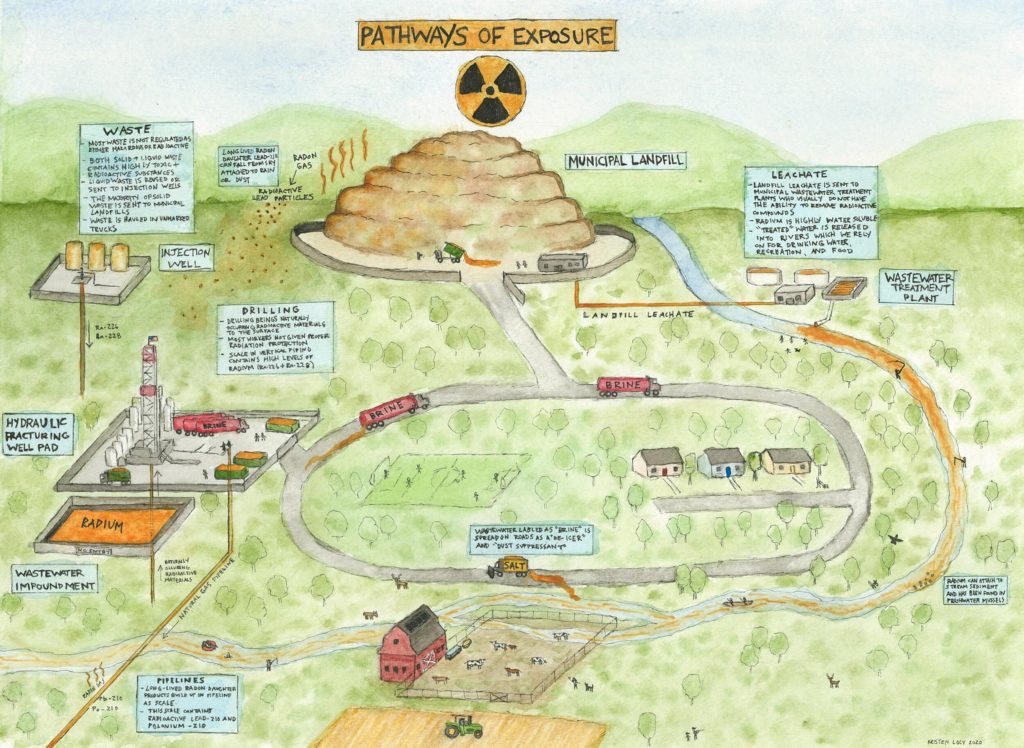
In response to the 2020 Attorney General Grand Jury Report on the unconventional oil and gas well industry, PA State Representative Rick Krajewski introduced House Bill (“HB”) 1467. This bill will help protect the health of citizens who live and work in communities with fracking by requiring two state agencies to work together – the Department of Environmental Protection (“DEP”) and the Department of Health (“DOH”). If the bill passes, DOH will work with the DEP to collect and analyze public health data related to fracking.
DOH currently does not play a role in the regulatory landscape for fracking, even though the industry is believed to have adverse health effects on the communities where it is taking place. The bill tasks them with collecting, analyzing, and publishing public health data related to fracking and the chemicals used in the process. DOH will collect data from individuals and public health professionals in fracking communities, including physicians. Those physicians who treat patients with symptoms that could be related to fracking must report those symptoms within 30 days from the first detection. Individuals who experience adverse public health effects that they believe to be related to fracking can also report their symptoms directly to DOH.
Under HB 1467, the DOH is required to analyze all data collected and publish its findings on an annual basis. As part of that requirement, DOH would create the Oil and Gas Production Health Registry which tracks participant exposure to known fracking activity. Participants in the registry upload their symptoms into the registry themselves.
It is not uncommon for individuals who experience adverse health issues related to fracking to sign non-disclosure agreements with gas companies. These non-disclosure agreements prevent residents from discussing the terms of the mineral lease agreements and water or land disturbances that have occurred because of fracking with anyone besides the fracking company or other signatories. Luckily, HB 1467 took these non-disclosure agreements into account and would make it so participants who report adverse health effects they’ve experienced cannot be held liable for violations of their non-disclosure agreement. Additionally, fracking companies would not be permitted to condition a settlement or employment agreement on non-participation in the program.
Another provision of the bill is concerned with public education. It charges DOH with the responsibility to inform community members about the public health impacts of fracking, including health symptoms associated with being in proximity to the industry. DOH must create a specific education and training program for physicians, so they are also familiar with symptoms that may be present in their patients. This is important because it informs residents of symptoms they should be aware of and report and is also a tool to use against the industry, discussed below.
To accomplish the goals of HB 1467, DOH must work with DEP, and the bill requires them to do so in several respects. First, the bill establishes an Interdepartmental Task Force which is composed of the Secretaries and other directors from each Department. The task force would have monthly meetings to discuss and analyze data and issue quarterly reports to certain state executive and legislative offices. Additionally, DEP must inform DOH when a new well permit application has been received because DOH must contract toxicologists to gather baseline biomarker indicators of participants and test for chemicals known to be used in fracking before any new well site is permitted. Plus, DEP must collect baseline water and air quality data within 2,500 feet of any site where new fracking infrastructure will be constructed, and then take measurements on a quarterly basis. DOH will also obtain the ability to receive health, environmental, or hydraulic fracturing infrastructure-related complaints due to this bill. They must share those complaints related to fracturing infrastructure with DEP and work with them to develop a response plan for each complaint. Finally, the bill would require DEP to report any industrial pollution event* to DOH within 24 hours of its occurrence.
Since this bill creates many new duties and responsibilities for DOH and DEP, it likely carries a high price tag for the state. However, to pay for the new program, operators must pay a $10,000 fee yearly for each facility which is then deposited into the public health registry fund. This part of the legislation is key because it requires the exploitative industry to “pay the price of harm reduction,” or at least pay for the evidence legislators, regulators, and courts may need to impose more stringent regulations on them.
How does this benefit Pennsylvania?
When one tunes into legislative hearings or other sessions related to the regulation of the fracking industry, they will again hear legislators ask the question: Where is the evidence linking fracking to the adverse health effects many Pennsylvanians are experiencing? While several studies have been conducted in Pennsylvania to show that correlation, many decision-makers have relied on the word of scientists employed by the industry that say there is no proof of such claims. If HB 1467 becomes law, depending on the findings, Pennsylvania could find its state agencies implementing more protections to best suit our health and our environment.
The public education campaign that DOH must embark on is another helpful tool for residents who want to see more restrictions on fracking in their own communities. Empowered with education and accurate data from DOH, citizens can ask their zoning boards for more significant setbacks and other harm mitigation measures that will reduce the effects of the fracking industry.
In conclusion, HB 1467 would be of great benefit to the residents of Pennsylvania. It will ensure DOH plays the role it needs to play to ensure the health of citizens is not further damaged by the fracking industry. The data that will be collected by this bill may be the proof we need to get stronger regulations, and the education campaign will help us in the fight.
*the discharge of chemicals, compounds, contaminants, particulate matter or other pollutants into or upon the land, any structure on land, the atmosphere or any watercourse or body of water, including groundwater, in concentrations or at levels in excess of those naturally present in the environment.

